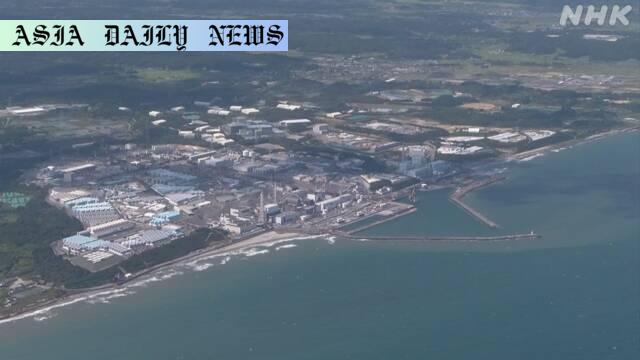Fukushima Water, examined directly by international experts, undergoes detailed sampling, raising awareness toward seafood trade resumption.

Fukushima Water Analysis: What It Means for Seafood Trade
The International Atomic Energy Agency (IAEA) has spearheaded a crucial initiative to monitor and analyze treated water from the Fukushima Daiichi nuclear power plant. In an unprecedented study, an international team of experts, including representatives from China, South Korea, Switzerland, and France, tested water directly at its source in the plant’s storage tanks. This marks the first time experts have collected samples of treated but undiluted water, sparking significant interest internationally as stakeholders observe potential worldwide implications.
Why Direct Sampling of Treated Water Matters
Ensuring global safety standards remains central to this initiative. Until now, discharged water has been diluted to reduce radioactive levels, specifically tritium content, before entering marine ecosystems. By sampling untreated water directly from the storage units, the team aims to address any lingering public skepticism about safety protocols. Reports suggest that only certain radioactive particles, notably tritium, persist post-treatment. However, the tritium concentration is significantly reduced upon dilution, reaching far below the safety thresholds set by the World Health Organization (WHO) for drinking water.
Supplementary Measurements and Their Broader Impacts
To complement its initial water collection effort, the IAEA team also sampled seawater near Fukushima Daiichi and analyzed seafood caught off the coast of Iwaki City. These tests intend to provide conclusive evidence regarding contamination claims and its potential effects on marine life—a significant step influencing decisions over bans on seafood imports from Japan by countries like South Korea and China, which remain skeptical of Japanese transparency on nuclear issues.
Japan-China Agreement: The Trade Conundrums
This evaluation forms part of groundbreaking efforts by Japan and China to reach common ground after an extended political impasse over seafood trade. Concerns over contaminated supplies led Beijing, one of Japan’s largest export markets, to impose stringent restrictions on Japanese seafood imports. Through additional surveillance, it is hoped that cooperation between the two governments can ease restrictions in a phased manner, thereby benefiting fisheries reliant on international markets.
Implications for Japanese Fisheries and Global Perception
Japanese fisheries are under significant strain as they await more definitive results. The analysis could benefit Japan’s seafood trade both locally and internationally, restoring confidence among consumers worried about food safety. After years of partial restrictions, the possibility of reopening China’s markets presents vital economic relief for Japan’s coastal communities who rely heavily on seafood exports.
A Transparent Approach Toward Safety and Accountability
For many observers, the current process underscores growing transparency in how Japan manages residues from the Fukushima disaster. By inviting international experts, Japan demonstrates a willingness to enforce checks irrespective of national pressures, aligning its practices with international safety standards. This transparent collaboration could serve as a global model to navigate complex issues surrounding energy production and its aftermath.
Conclusion: A Decisive Step in Cross-Border Cooperation
While the complete results remain forthcoming, this study represents a stepping stone in addressing political and public doubts. By adhering to high standards of accountability, the IAEA-led effort can foster trust between competing nations. A positive outcome would not only provide economic relief to the Japanese fishing industry but also set the tone for broader nuclear safety practices in other nations, emphasizing rigorous monitoring and international dialogue in crisis management.
Commentary
Fukushima Water Monitoring: A Promising Step Forward
The initiative to directly analyze treated water from the Fukushima Daiichi storage tanks is undoubtedly a commendable move. For years, concerns surrounding radioactive contamination of marine life have persisted, affecting livelihoods dependent on fisheries and raising questions about transparency in Japan’s management of this post-disaster fallout.
The Role of International Oversight
Bringing together experts from diverse nations not only ensures robust monitoring but also lends credibility to the entire process. People need assurance, particularly when international trade and food consumption are involved. This collaborative approach mirrors what the world needs more of—joint efforts focusing on shared concerns, rather than unilateral decisions that may lack global backing.
Challenges and Economic Ramifications
The resumption of seafood trade between Japan and China remains a crucial objective. With China being a significant seafood importer, the stakes are monumental for Japanese fisheries. However, the road to rebuilding trust is long and potentially complicated by political interests and fragmented public opinion.
Looking Toward Broader Applications
What’s fascinating is how this initiative could define safety checkpoints for nuclear power waste handling globally. Every nation grappling with similar risks will look to the IAEA-led effort as evidence of best practices. Beyond addressing Fukushima alone, this study highlights pragmatic solutions rooted in transparency.
Ultimately, these monitoring efforts are about restoring faith—faith in science, international cooperation, and its commitment to prioritize health and sustainability over profit margins and political divides. It is a stride in the right direction, with lessons to be extracted across the board.


